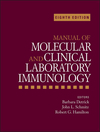Autoantibodies to Glycolipids in Peripheral Neuropathy
Hugh J. Willison
Search for more papers by this authorHugh J. Willison
Search for more papers by this authorBarbara Detrick
Johns Hopkins University, School of Medicine, Baltimore, Maryland
Search for more papers by this authorJohn L. Schmitz
University of North Carolina, School of Medicine, Chapel Hill, North Carolina
Search for more papers by this authorRobert G. Hamilton
Johns Hopkins University, School of Medicine, Baltimore, Maryland
Search for more papers by this authorAbstract
Peripheral neuropathies constitute a diverse group of diseases caused by a wide range of genetic, toxic, metabolic, and inflammatory insults to the peripheral nervous system. A considerable proportion of neuropathies are believed to have an autoimmune basis, either as a feature of systemic autoimmune diseases, vasculitides, or paraneoplastic or postinfectious syndromes, in association with lymphoproliferative diseases, or as isolated peripheral nerve syndromes. In clinical practice, the cause of sporadic neuropathies is often obscure, resulting in the frequent use of multiple screening tests to aid in diagnosis. Over the last 20 years, there has been a widespread increase in the use of antiganglioside antibody assays as diagnostic tools, based on the recognition from research studies that gangliosides are important autoantigens in many patients with autoimmune peripheral nerve disorders (1).
References
- Willison HJ, Yuki N. 2002. Peripheral neuropathies and anti-glycolipid antibodies. Brain 125: 2591–2625.
- Latov N. 1994. Antibodies to glycoconjugates in neuropathy and motor neuron disease. Prog Brain Res 101: 295–303.
- Pestronk A. 1998. Multifocal motor neuropathy: diagnosis and treatment. Neurology 51(Suppl 5): S22–S24.
- Ilyas AA, Willison HJ, Quarles RH, Jungalwala FB, Cornblath DR, Trapp BD, Griffin DE, Griffin JW, McKhann GM. 1988. Serum antibodies to gangliosides in Guillain-Barré syndrome. Ann Neurol 23: 440–447.
- Chiba A, Kusunoki S, Obata H, Machinami R, Kanazawa I. 1993. Serum anti-GQ1b IgG antibody is associated with ophthalmoplegia in Miller Fisher syndrome and Guillain-Barré syndrome: clinical and immunohistochemical studies. Neurology 43: 1911–1917.
- Mizutamari RK, Wiegandt H, Nores GA. 1994. Characterization of anti-ganglioside antibodies present in normal human plasma. J Neuroimmunol 50: 215–220.
- Kissel JT. 1998. Autoantibody testing in the evaluation of peripheral neuropathy. Semin Neurol 18: 83–94.
- Willison HJ, Goodyear CS. 2013. Glycolipid antigens and autoantibodies in autoimmune neuropathies. Trends Immunol 34: 453–459.
- Willison HJ, O'Leary CP, Veitch J, Blumhardt LD, Busby M, Donaghy M, Fuhr P, Ford H, Hahn A, Renaud S, Katifi HA, Ponsford S, Reuber M, Steck A, Sutton I, Schady W, Thomas PK, Thompson AJ, Vallat JM, Winer J. 2001. The clinical and laboratory features of chronic sensory ataxic neuropathy with anti-disialosyl IgM antibodies. Brain 124: 1968–1977.
- Kornberg AJ, Pestronk A, Bieser K, Ho TW, McKhann GM, Wu HS, Jiang Z. 1994. The clinical correlates of high-titer IgG anti-GM1 antibodies. Ann Neurol 35: 234–237.
- Galban-Horcajo F, Fitzpatrick AM, Hutton AJ, Dunn SM, Kalna G, Brennan KM, Rinaldi S, Yu RK, Goodyear CS, Willison HJ. 2013. Antibodies to heteromeric glycolipid complexes in multifocal motor neuropathy. Eur J Neurol 20: 62–70.
- Yuki N. 1998. Anti-ganglioside antibody and neuropathy: review of our research. J Peripher Nerv Syst 3: 3–18.
- Ho TW, Willison HJ, Nachamkin I, Li CY, Veitch J, Ung H, Wang GR, Liu RC, Cornblath DR, Asbury AK, Griffin JW, McKhann GM. 1999. Anti-GD1a antibody is associated with axonal but not demyelinating forms of Guillain-Barré syndrome. Ann Neurol 45: 168–173.
- Kaida K, Kusunoki S. 2010. Antibodies to gangliosides and ganglioside complexes in Guillain-Barré syndrome and Fisher syndrome: mini-review. J Neuroimmunol 223: 5–12.
- Kusunoki S, Kaida K. 2011. Antibodies against ganglioside complexes in Guillain-Barré syndrome and related disorders. J Neurochem 116: 828–832.
- Rinaldi S, Brennan KM, Willison HJ. 2012. Combinatorial glycoarray. Methods Mol Biol 808: 413–423.
-
IUPAC-IUB Commission on Biochemical Nomenclature (CBN). 1977. The nomenclature of lipids. Eur J Biochem 79: 11–21.
10.1111/j.1432-1033.1977.tb11778.x Google Scholar
- Schnaar RL. 1994. Isolation of glycosphingolipids. Methods Enzymol 230: 348–370.
- Willison HJ, Veitch J, Swan AV, Baumann N, Comi G, Gregson NA, Illa I, Zielasek J, Hughes RA. 1999. Inter-laboratory validation of an ELISA for the determination of serum anti-ganglioside antibodies. Eur J Neurol 6: 71–77.
- Ravindranath MH, Ravindranath RM, Morton DL, Graves MC. 1994. Factors affecting the fine specificity and sensitivity of serum antiganglioside antibodies in ELISA. J Immunol Methods 169: 257–272.
- Zielasek J, Ritter G, Magi S, Hartung HP, Toyka KV. 1994. A comparative trial of anti-glycoconjugate antibody assays: IgM antibodies to GM1. J Neurol 241: 475–480.
- Willison HJ, O'Hanlon GM, Paterson G, Veitch J, Wilson G, Roberts M, Tang T, Vincent A. 1996. A somatically mutated human antiganglioside IgM antibody that induces experimental neuropathy in mice is encoded by the variable region heavy chain gene, V1-18. J Clin Invest 97: 1155–1164.
- Alaedini A, Wirguin I, Latov N. 2001. Ganglioside agglutination immunoassay for rapid detection of autoantibodies in immune-mediated neuropathy. J Clin Lab Anal 15: 96–99.
- Kaida K, Morita D, Kanzaki M, Kamakura K, Motoyoshi K, Hirakawa M, Kusunoki S. 2004. Ganglioside complexes as new target antigens in Guillain-Barré syndrome. Ann Neurol 56: 567–571.
- Willison HJ, O'Hanlon GM. 1999. The immunopathogenesis of Miller Fisher syndrome. J Neuroimmunol 100: 3–12.
- Adams D, Kuntzer T, Burger D, Chofflon M, Magistris MR, Regli F, Steck AJ. 1991. Predictive value of anti-GM1 ganglioside antibodies in neuromuscular diseases: a study of 180 sera. J Neuroimmunol 32: 223–230.
- van Schaik IN, Bossuyt PM, Brand A, Vermeulen M. 1995. Diagnostic value of GM1 antibodies in motor neuron disorders and neuropathies: a meta-analysis. Neurology 45: 1570–1577.
- Ito M, Matsuno K, Sakumoto Y, Hirata K, Yuki N. 2011. Ataxic Guillain-Barré syndrome and acute sensory ataxic neuropathy form a continuous spectrum. J Neurol Neurosurg Psychiatry 82: 294–299.



